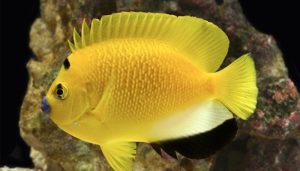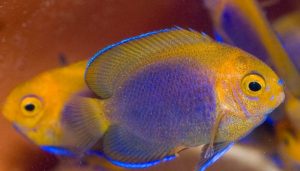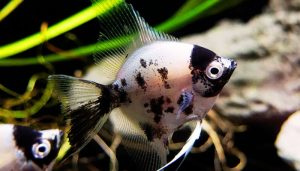If you’re dealing with an overpopulation of guppies in your aquarium, finding the right balance can be tricky. Guppies are prolific breeders, and their fry can quickly overwhelm the tank. One effective and natural solution is introducing fish that eat guppy fry.
These predatory fish not only help maintain a manageable guppy population but also add variety and vibrancy to your tank. But which species are best suited for the job? Keep reading to discover the top predators that can help control guppy fry numbers in your aquarium.
What will eat guppy fry? Some of the best fish for eating guppy fry include cichlids, paradise fish, rainbowfish, angelfish, Congo tetras, and gourami.
These species are not only effective at managing fry populations but also coexist well in community tanks when their needs are properly met.
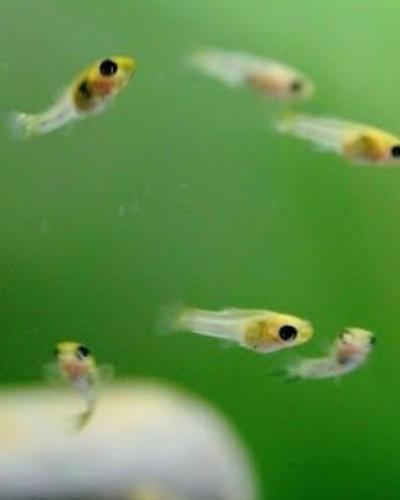
By selecting the right predator for your setup, you can maintain harmony in your aquarium while preventing overcrowding. Each of these fish brings its unique characteristics and beauty, making them a practical and aesthetic addition to your aquatic environment.
Table of Contents
ToggleWill My Other Fish Eat Baby Guppies?
It is possible that adult guppies and other fish in the aquarium, such as cichlids, may eat baby guppies. Adult guppies are not known to be aggressive towards their young, but other fish may see the baby guppies as prey.
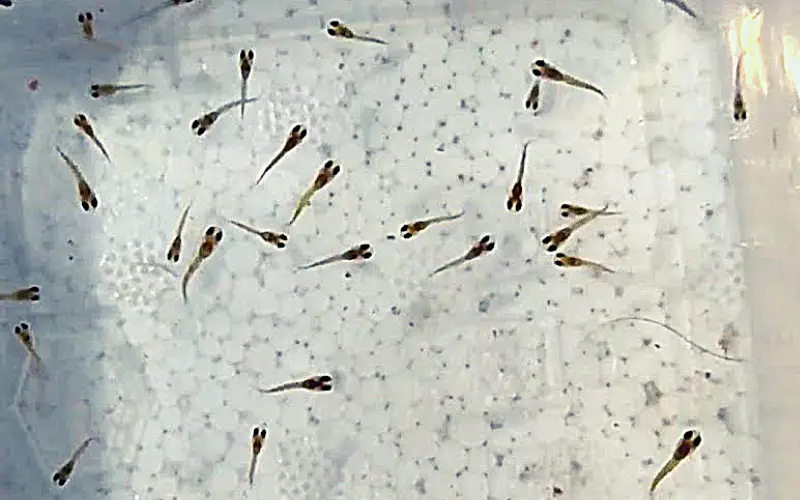
If you want to increase the survival rate of your baby guppies, you can provide them with hiding places in the aquarium, such as plants or decorations. You can also consider separating the pregnant female guppies and placing them in a breeding or nursery tank until they give birth.
It’s important to note that some cichlids are known to be aggressive towards smaller fish, so it’s essential to research the specific species of cichlid in your aquarium and their compatibility with guppies before adding them to the same tank.
List Of Best Fish That Eat Guppy Fry: (TOP 7 Predators!)
What fish will eat guppy fry? Let’s get to the heart of the matter and learn about these relentless guppy fry predators. Brace yourself as we unveil the secrets of their hunting prowess and survival strategies.
In a community tank, it’s essential to consider the compatibility of fish species, especially when some are predatory and may eat smaller fish like guppies.
Here’s a list of the best fish to control guppy population:
1. The Voracious Betta Splendens
The Betta splendens, more commonly known as the Siamese fighting fish, tops our list of ruthless guppy fry predators. Be aware of their captivating appearance; these beauties have an aggressive streak that extends to their dietary habits. With their long, flowing fins and vibrant colors, bettas are popular in aquariums, but they have no qualms about devouring guppy fry when given the chance.
2. The Cunning Corydoras Catfish
Corydoras catfish might appear innocent with their playful demeanor, but they are far from harmless regarding guppy fry. These clever bottom-dwellers have adapted to prey on tiny aquatic organisms, including the defenseless guppy fry. Their schooling behavior and catfish mustache add to their charm, but guppy owners must be cautious about keeping them together.
3. The Ambush Specialist: Angelfish
Angelfish, known for their graceful appearance and majestic fins, are skilled ambush predators. They patiently wait for guppy fry to come within striking distance and swiftly gulp them down. Their impressive hunting technique and unique patterns make them a perfect choice for aquarium enthusiasts but be prepared for their predatory instincts.
4. The Agile Gouramis
With their labyrinth organ allowing them to breathe atmospheric air, Gouramis have a unique advantage in pursuing guppy fry. These agile fish can easily navigate through densely planted aquariums, making it challenging for guppy fry to escape their clutches. Their territorial behavior further accentuates their predatory nature.
5. The Notorious Goldfish
Goldfish, often seen as gentle and peaceful, can surprise guppy owners with their predatory instincts. As opportunistic feeders, they won’t hesitate to prey on guppy fry. While they might not be as agile or aggressive as some other predators on this list, their constant foraging can threaten guppy fry survival.
6. The Cunning Killifish
Killifish are notorious for their adaptability and ability to thrive in various aquatic environments. With a diverse diet that includes tiny invertebrates and fry, they are a significant threat to guppy fry populations. These cunning predators use their speed and stealth to their advantage, making them formidable in any aquarium.
7. The Merciless Swordtails
Swordtails, named for their distinct elongated tail fins, can be merciless when hunting guppy fry. Their aggressive tendencies and swift movements make them efficient predators, often targeting the smallest and weakest members of the guppy population. Swordtails are beautiful but can be a menace to the survival of guppy fry.
How Do You Stop Guppies from Eating Fry?
Taking a few precautions in the aquarium is essential to prevent guppies from eating their fry. One effective method is to provide ample hiding places and dense vegetation for the fry to seek refuge in.
This could be achieved by adding live plants, floating plants, or artificial decorations with small crevices for the fry to hide in. Additionally, separating the fry from the adult guppies is beneficial once they are born. This can be done using a breeding box or a separate nursery tank.
By keeping the fry away from the adult guppies, their chances of survival significantly increase as they are not at risk of being eaten. Furthermore, introducing larger fish into the aquarium can also help deter the adult guppies from preying on the fry.
The presence of bigger fish makes the adult guppies feel less dominant and less likely to engage in cannibalistic behavior. Providing hiding spots, separating the fry from the adult guppies, and introducing larger fish can effectively prevent guppies from eating their fry.
Is There A Way To Raising Guppy Fry With Adult Fish?
Raising guppy fry with adult fish is possible but requires careful consideration and monitoring. Guppy fry is highly vulnerable and can be eaten by adult fish if not adequately protected.
It is advisable to provide separate breeding tanks for the fry. These tanks should have sufficient hiding spots and plants to offer protection. Additionally, feeding the fry with a specialized diet is crucial for their growth and development.
Adult fish may also be separated from the fry using a mesh divider in the guppy tank. However, it is essential to note that some adult guppies may still pose a threat to the fry, so close attention should be paid to their behavior.
What Fish Eat Guppy Tails and How to Treat Them?
Several types of fish may prey on guppy tails in an aquarium setting. Predatory fish such as cichlids, territorial fish, and even some schooling fish may hunt down guppies and nip their tails.
There are several aquarium fish that will eat guppy tails, including:
- Cichlids: Cichlids are diverse fish found in tropical and subtropical waters worldwide. Many cichlids are predatory fish that will eat other fish, including guppies. Some popular cichlids known to eat guppy tails include Oscars, jack Dempseys, and blood parrots.
- Other predatory fish: Other predatory fish that fish will eat guppy tails include bettas, barbs, and pike minnows. These fish are all aggressive hunters that will prey on smaller fish, including guppies.
- Territorial fish: Some territorial fish, such as gouramis and angelfish, may also nip at guppy tails. These fish are not necessarily predatory, but they may become aggressive if they feel threatened by the guppies.
- Schooling fish: Schooling fish like Danios and Tetras may also nibble on guppy tails. These fish are not typically predatory but may mistake the guppy tails for food.
If your guppies are having their tails eaten, there are a few things you can do to treat them:
- Isolate the injured fish: If a guppy has a badly bitten tail, it is best to isolate it in a separate tank. This will prevent other fish from further damaging the tail and allow it to heal.
- Add Epsom aquarium salt: Adding aquarium salt to the tank can help to prevent infection and promote healing.
- Change the water frequently: Regular changes will help keep the water clean and bacteria-free.
- Avoid adding new fish: If you are adding fresh fish to the tank, be sure to choose species that are not known to be aggressive towards guppies.
With proper care, most guppies can recover from a bitten tail. However, saving the community fish may be impossible if the tail is severely damaged.
How to Provide Hiding Places and Plants for Your Guppies?
To provide hiding places and plants for your guppies in the aquarium, there are a few simple steps you can take. First, it is vital to add decoration to the tank. You can use rocks, caves, or driftwood to create hiding spots for your guppies.
These objects will give the fish a sense of security and a place to retreat when they feel stressed or threatened. Additionally, live plants can be added to the aquarium.
Plants such as java fern, anubias, or hornwort provide hiding places and improve water quality by absorbing nitrates. The leaves of these plants will offer shade and shelter for the guppies, especially for the baby guppies who need to hide from potential predators.
Make sure to choose plants that are suitable for the size of your community tank and provide enough space for the fish to swim and hide. Regularly maintaining the plants and removing any dead leaves will help keep the aquarium healthy and the hiding places intact for your guppies.
Can You Feed Guppy Fry to Bettas?
Feeding guppy fry to bettas can be a risky decision. While both guppies and bettas are carnivorous, bettas are known to be aggressive predators.
The size difference between guppy fry and adult bettas can pose a problem. Adult bettas may mistake the guppy fry for food and attack them. This can lead to injuries or even death for the small guppies. Separating the guppy fry from bettas is generally recommended to ensure their safety.
However, if the guppy fry grows, they may eventually be able to defend themselves against bettas. Careful observation and consideration of the size and temperament of both fish are essential before attempting to feed guppy fry to bettas.
How Many Baby Guppies Can a Betta Fish Eat?
A betta is the best fish for eating baby guppies, especially in fry form. The betta, known for its territorial nature, sees the guppy fry as potential resource competitors and may view them as food.
However, the number of guppies a betta fish can consume largely depends on the individual betta’s appetite and size. A giant and hungrier betta may devour several baby guppies quickly, while a smaller or less hungry betta may only eat the fry.
Monitoring the betta fish’s behavior and ensuring a balanced diet is essential, as overfeeding baby guppies may result in digestive issues or health problems.
Commonly Asked Questions about Fish Eat Guppy Fry (FAQs)
Are all guppy fry destined to be prey for these predators?
Not necessarily. While guppy fry face threats from various predators, providing ample hiding spots and densely planted aquariums can significantly improve their chances of survival.
Can guppies coexist peacefully with these ruthless predators?
It’s not impossible, but cautious planning and proper tank setup are essential. Separating guppy fry from potential predators or choosing non-predatory tank mates is advisable.
How many fry can a female guppy produce, and why is it important to know this?
A female guppy can produce anywhere from 20 to 200 fry at a time. Knowing this is crucial as it helps guppy owners prepare suitable conditions for survival and ensures adequate care and attention.
Do ruthless predators serve any ecological purpose in aquariums?
Yes, they do. Predators play a significant role in maintaining the ecological balance of aquariums by controlling the population of smaller fish and ensuring the survival of more robust, healthier individuals.
What should I feed these ruthless predators if not guppy fry?
It’s essential to provide a balanced diet to predatory fish, including high-quality commercial pellets, live or frozen foods like bloodworms, brine shrimp, daphnia, and occasional vegetable matter.
Can guppy fry survive without their parent’s presence?
Guppy fry are born independent and can survive independently, given the right environment and suitable food sources.
What are the most common predators for guppy fry?
The most common predators for guppy fry are cichlids, swordtails, large fish, and leopard bush fish.
Can male guppies be kept with these predatory fish?
To ensure their safety, it’s best to keep male guppies separate from these predatory fish.
Do I need a large tank to keep predator fish that eat guppy fry?
Yes, it is recommended to have a larger tank, preferably a gallon tank, to accommodate the predatory fish.
Why do some fish eat the guppy fry?
Some fish species are naturally carnivorous and have a diet that includes consuming smaller fish like guppy fry.
Is there a way to control the guppy population without predatory fish?
Yes, other methods exist to control the guppy population, such as separating male and female guppies or introducing peaceful fish that do not attack guppies.
What are some other fish that can eat guppy fry?
Some other fish that can eat guppy fry include clown knife fish and certain species of aggressive cichlids.
Can guppies be kept together with aggressive fish?
Keeping guppies with aggressive fish is not recommended, as aggressive fish may attack or eat them.
Are there any common aquarium fish that won’t eat guppy fry?
Yes, peaceful fish species are commonly kept in aquariums and do not tend to eat guppy fry.
Can guppy fry be eaten by other fish in the tank?
Yes, other fish in the tank, significantly larger or carnivorous, may consume guppy fry if given the opportunity.
Are there any tropical fish that can be kept together with guppies?
Yes, plenty of tropical fish species can coexist peacefully with guppies without posing a threat to their fry.
What fish that quill easy guppy fry without eating adult fish?
Betta fish are a good option for controlling guppy fry populations without harming adult fish. They are natural predators of small fish and will happily snack on guppy fry, but they are not aggressive towards larger fish.
Conclusion
In conclusion, keeping guppies in your aquarium can be a rewarding and enjoyable experience. Still, knowing the potential risks posed by community fish that will eat guppy fry is essential. Educating yourself on which fish are the biggest threats and protecting your guppy babies can help ensure your aquarium’s long-term health and happiness. Remember to keep your tank clean and well-maintained, and monitor your fish closely for any signs of aggression or predation. With a little effort and attention, you can create a thriving tank ecosystem that supports a diverse range of fish species.
So don’t let the fear of fish that eat guppy fry discourage you from keeping these delightful little fish. With the proper precautions and some know-how, you can make a safe and healthy environment that your guppies will love. Happy fish keeping! Check out our ultimate guide, “What fish eat guppies?” if you want to learn more about fish that eat guppies fry.
You might also like
- Mosquito Fish Vs Guppy Fish: 5 Differences You Should Know!
- Do Guppies Eat Plants: 7 Best Live Plants for Guppies Tank!
- When to Separate Pregnant Guppy: (A Comprehensive Guide)
- Do Guppies Eat Snails: Amazing Friendship or Deadly Feud?
- Endler Guppy Hybrids: 5 Mind-Blowing Facts You Need to Know!
- The Ideal Guppy Male to Female Ratio: A Comprehensive Guide


